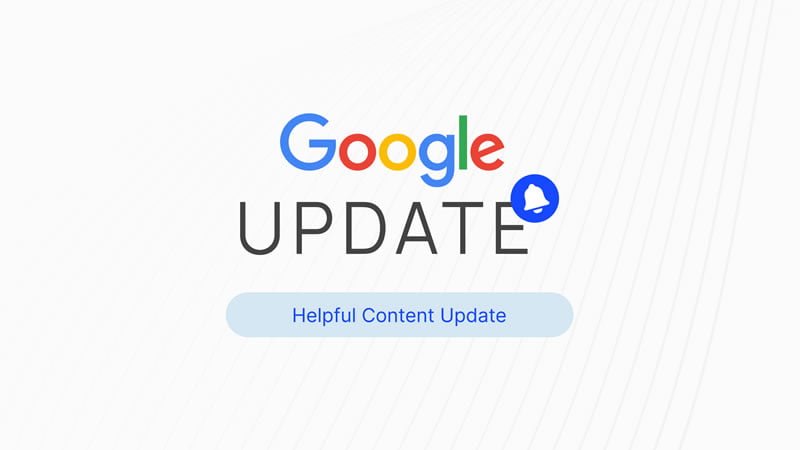[ad_1]
In August, Google began disseminating new policies and recommendations for website owners and content providers. These new methods are geared toward providing people with content that is unique to them and helpful. The purpose of the Google’s Helpful Content Update is to encourage material authors to invest more time and energy into the production of high-quality content.
The update in question is being likened to previous preview algorithm modifications such as Panda and Penguin, both of which forced SEO professionals to modify the method in which they build their tactics.
What does this truly alter in terms of how SEO specialists and marketers go about their work, although it sounds fairly great in theory? According to what Google helpful content update, content producers should prioritize people and steer clear of producing material just for search engines.
According to the statement released by Google, the company is always trying to improve Google Search’s ability to link users to beneficial content. To do this, we are introducing an upgrade that we refer to as the “helpful content update.” This helpful content update is a component of a larger initiative that aims to guarantee that people see more original, useful information produced by people, for people, in search results.
Put the focus on the audience first in your content:
The helpful content update intends to better reward material where visitors feel like they’ve had a pleasant experience, while content that does not fulfill a visitor’s expectations will not perform as well as it previously did.

How To Strategize Your Content After Google Helpful Content Update?
Do Not Veer Off Topic:
Suppose you own a website that provides project management and you see the potential in capitalizing on a high-volume term that is associated with construction tools. It may sense in construction projects but not the tools but you want to insert the keywords.
Even though the content could be informative, it is very improbable that an established audience that visits the site looking for recipes would find it helpful.
In addition, Google recommends that you ask yourself the following questions about relevant topics:
- Is the primary purpose of the material to attract users from search engines, or was it written with human readers in mind?
- Do you find yourself writing about topics just because they seem to be popular at the moment, rather than because you would normally write about such topics for the audience you already have?
Be Careful Not to Depend Too Much on AI:
The practice of publishing a large number of articles in a shorter amount of time using material generated by AI is a relatively new method. Nevertheless, you have to reconsider whether or not an AI can create the material for you. Human editing is essential to make up the gap if these tools are going to help optimize your content.
When developing a piece of content, it is important to make use of a variety of resources, such as real data, information about your rivals, and social listening. Google helpful content update works for the benefit of human editing.
Do Not Post Large Amounts of Information That Is General:
Instead, focus on writing excellent content that satisfies your reader when entering a company blog and provides them with essential answers and insights. The preparation of this item requires both time and advanced planning.
Before you search for the keyword rankings you would want to get on SERP, you should first ask yourself this question: how can I give value to this topic? Because of this, you will have a far better chance of avoiding the desire to write a large quantity of material that is of poor quality, unplanned, and general.
What Google helpful content update is essentially telling us is focusing on what readers want.
When we write a new post, let us not forget that there is another living human being who will be reading it. The primary goal of the Helpful Material Update is to instill in us the habit of keeping in mind that the primary reason we create content is to assist our audience.
Avoid Combining Several Different Subjects into One Website:
A website cannot cater to everyone’s needs and interests at the same time. Not only is this useless information for site users, but it also makes it difficult for search engines to comprehend the content of the website.
Construct your website such that it focuses on a single topic. If you want to publish material on a variety of subjects, you may always establish many websites to house your work.
Respond Suitably to The Questions Raised by Users Of Search Engines
When creating content for search engines, you may write a lot without really contributing anything of value to the conversation. When you are producing content for other people, try to assist them in answering a question or resolving a problem that brought them to your website in the first place.
To refine and filter your content, please answer the following questions, which have been suggested by Google itself:
How can you avoid writing things in a manner that prioritizes search engines? And also work in line with the Google
If you gave affirmative responses to any or all of the following questions, it is a red flag indicating that you have to reconsider how you are producing content throughout your site:
- Is the primary purpose of the material to attract users from search engines, or was it written with human readers in mind?
- Are you creating a lot of material covering a variety of subjects with the expectation that some of it would do well in search results?
- Do you generate material on a wide variety of subjects with the help of heavy automation?
- Are you mostly restating what others have said without contributing much of your insight or value?
- Do you find yourself writing about topics just because they seem to be popular at the moment, rather than because you would normally write about such topics for the audience you already have?
- Do readers walk away from your material with the idea that they need to go farther afield to get more reliable information from other sources?
- Have you joined a certain niche issue area having no genuine experience in the field, but because you assumed you would generate search traffic?
- Does your material imply that there solves a problem that does not have a solution? For example, does it imply that there is a release date for a product, movie, or television program when there is no such date confirmed?
The Closing Remarks
The helpful content upgrade that Google is bringing out will continue to do so over the following two weeks. It will be easier to evaluate the effect if you hold off until the upgrade is finished.
The upgrade is now only applicable to searches conducted in English, but it will eventually roll out to other languages as well. There will be further helpful content updates released by Google besides this one. In the first statement that Google made, the company clarifies that it intends to continuously improve its ability to identify harmful information.
[ad_2]
Source link





